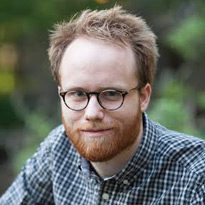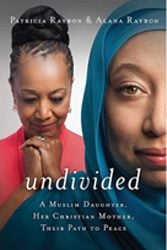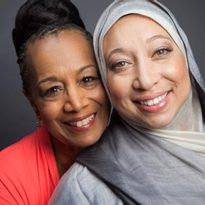{Brady Udall. The Lonely Polygamist. W.W. Norton & Company 2010. 602 pages. $26.95}
Reviewed by David Crumm
This is a novel about a very big Mormon family. You’re from a famously big Mormon family yourself. So, let’s start with your place in your own family tree. Your great-great-grandfather was David King Udall, a polygamist. More than a century later, the family tree now includes a former U.S. Secretary of the Interior and U.S. Senators. The “Udall family” page in Wikipedia is the only Wiki biography I’ve seen with an actual family chart on the page! So, where are you in that sprawling Udall family tree? The boxes in the Wiki chart only show the politicians.
My father is Barry and my grandfather is Keith. Keith is the first cousin to Mo and Stewart who are the ones most people might know.
Do you know them or the senators? You’re a journalist and a novelist and you’ve had years of experience in national media. Have you crossed paths with these politically famous Udalls?
No, they’re just my relatives. We’re just blood. That’s it. The family is so huge that we rarely even run across each other. The ones I run across are my hundreds of first cousins, aunts, and uncles. I’ve never been involved in politics at all.
But now, every day when I’m traveling to talk about the book, I get asked this question: “Do you know this Udall? That Udall?” I always say: “I’m related to all of them, but I don’t know half of them.”
When I began reading Lonely Polygamist, Carl Hiaasen and his comic novels about Florida came to mind. Hiaasen paints these sprawling portraits of good-hearted people caught up in dysfunctional families and communities, spiraling out of control in comic ways. But, in the end, you always know Hiaasen loves Florida and loves his central characters. Is that a fair thing to say about you and your part of the country?
That’s an absolutely fair thing to say. I won’t write a novel about people I don’t love, and by that I mean people I understand and respect and want to know more about. This is a dysfunctional family I’m writing about, trying to survive on the fringes of things, but yes I do love these people. I am aware of Hiaasen and I’ve read some of his shorter pieces, but I haven’t read his novels. I do know he’s funny and people enjoy his books so I am flattered by that comparison.
Well, you can’t read a Hiaasen novel and not get into essential Florida settings like the Everglades. There’s a compelling sense of place in his novels. I immediately got a strong sense of place from your novel as well. You’re rooted in that often strange and sometimes threatening Western landscape that’s the heart of the Mormon world. Like Hiaasen, you populate your landscape with these endearingly quirky people.
I do live out in the intermountain West. I live in Boise, Idaho, and we spend time between Boise and a little town called Teasdale in south-central Utah where we spend summer months on the edge of Capitol Reef National Park. It’s one of the least-known parks, but it’s terrific. So, I do know this landscape and there are lots of people out here who make great characters in novels. If you’re looking for people to put in a book like Lonely Polygamist, it’s pretty easy pickin’s out here. I know these people.
This prompts me to ask, are you a polygamist yourself?
(Laughs!) No, not at all.
Your book-jacket mini-biography says you’re married and have children.
Yes. One wife. Four kids.
We’ve already mentioned that you’re part of a famous family in the Church of Jesus Christ of Latter-day Saints. We probably should point out here that polygamy has long been condemned by the mainline Mormon church. But tell me about your own relationship to the church.
I’m in an odd place for a Mormon. I value it. I have always been a Mormon and I will always be a Mormon. For me it’s like what I hear Catholic or Jewish friends describe. You can’t easily say: I’m not Mormon anymore. It’s a part of your whole life.
I’ve reported on the LDS church over the years. I’ve spent time in Salt Lake City reporting on the church’s global operations and I’ve got a lot of respect for many of the things Mormon leaders have done to strengthen communities. So, I know the mainline church is different than the polygamist offshoot in your novel. But tell me more about your own personal relationship to the LDS church. For example, do you participate regularly in temple rites? That’s something a Mormon in good standing might do as a regular part of life.
No, I don’t do that. It’s hard to describe this to non-Mormons. I know Presbyterians who go to church three times a year and consider themselves good Presbyterians. It’s not like that for Mormons. You can’t get away with that kind of inactivity. I do go to church about half the time, but that’s not considered sufficient in the LDS church. I’m trying to sit on the fence without sliding off it one way or the other.
Anyone who Googles your background will find stories about the 1998 article you reported for Esquire after spending time with various polygamist families in the West. Pretty easily via Google, you can find web posts from people who liked that story and those who hated it. You’ll also find people who say that HBO swiped your idea for the “Big Love” series. Can you clear up that confusion?
It’s a little complicated. I wrote that article in 1997 and it was published in 1998. It’s true that the original title for my article was “Big Love.” That’s the title I gave it and I thought Esquire was going to publish it under that title. When it came out, Esquire had renamed it “The Lonely Polygamist.” They did that without even telling me about the change, but I thought it was a better title at the time. Then, some years later, “Big Love” came out on HBO and there’s nothing more I can say about that connection. I don’t know anything more than what I’ve just said. If someone online says HBO ripped off my article, then that’s just their perspective. I don’t know that at all.
Your Esquire article has the same title as your book and there are some similar themes here. The two texts — Esquire and your book — open with similar themes. Is this novel the book-length version of the Esquire piece?
My original article was not the basis of this novel, no. That Esquire piece was just the starting point of my research into polygamy. I did years of work after the Esquire piece.
Having read both the Esquire piece and your new novel, I do agree that these are different stories — although both of the men at the heart of the stories are conspicuously big, tall guys under tons of pressure from their wives.
But, let me ask you about another important reference when Americans think about Mormon splinter groups: Jon Krakauer’s Under the Banner of Heaven: A Story of Violent Faith. I run into lots of Americans who don’t know anything about polygamy or the Mormon tradition except what they’ve read in Krakauer’s book. I’ve got to say to readers of this interview: If that’s all you know about this subject, The Lonely Polygamist is going to be a real shock! What would you say about Krakauer’s book?
I would say that Krakauer’s book is not the right book to read if you want to understand polygamy or the Mormon church. It is an interesting book, but it’s all about a very, very small sliver of religious experience that comes out of the Mormon tradition. On top of that, he makes some logical leaps about connections between religion and violence that I’m not happy with at all. At its core, his book argues that Mormonism is a violent religion. Now, I grew up in the church. I have a very deep background in the church. That claim Krakauer makes is just absurd when I hear it, given what I know. Violence shows up in many religious traditions, but Krakauer’s book takes those claims way too far.
Do you run into people who’ve only encountered this subject through Krakauer’s book?
I have noticed people who seem to have a very strong reaction to my novel and I think that’s because they’ve read things like the Krakauer book. They assume that anyone who would practice polygamy must be a violent, criminal child abuser. But that’s not the experience I’ve seen meeting lots of people who live in these relationships. The people I’ve met are normal, wonderful, spiritual, nice people.
How many polygamist families did you get to know in your research?
Six or eight families. Let’s see: some in suburban Salt Lake City, a couple in southern Utah, one in northern Arizona, and one in southwestern Colorado. These are families who easily let me into their lives and let me spend time with family members to see what it’s like.
This is a novel, so I want to help our readers get a quick sense of the cast of characters. So, I’m going to name some of the main characters people will meet in the book — then you tell me your concise description of each one, plus tell me how you’d like to see them cast in a movie version of your book, okay?
Sure.
Golden Richards, the main character throughout the novel — the father and husband trying to survive everything that happens. Describe him. And who plays Golden in your ideal movie version?
Well, he’s a big, sweet, overwhelmed man who is out of his depth with his family. If I was going to cast somebody to play Golden, it’d have to be somebody large and someone who can play Golden’s clueless qualities, too. Maybe Jeff Daniels.
Yeah, I can see that! Good. Okay, so let’s talk about Golden’s most important wife, Beverly, who oversees the other wives and is so strict that many of the kids pretty much are in fear of her temper.
Beverly is the real power who rules the family with an iron fist and really holds everything together. But who could play that? Meryl Streep could, but Meryl Streep is a little too old now. Beverly is in her mid 40s.
Hmmm, I like the idea of Meryl Streep as an image of Beverly. So, let’s go with that. Then — Golden works for this crazy boss, Ted Leo. Among other challenges, Golden finds that economic times are so tough that he’s forced to work on a project that he has to keep it a secret from his own family. He’s actually building a brothel in Nevada for Ted Leo. Golden thinks no one knows what he’s doing over in Nevada, but — like everything in this book — it’s more complicated than that. So, describe this larger-than-life boss Ted Leo.
He’s someone who wants to be a big shot and acts tougher than he really is. He’s mercurial. At one point in the book, Golden says that nobody can tell what Ted Leo is going to do at any given moment. I’d say Dennis Hopper would be perfect to play Ted Leo, if Dennis hadn’t passed away.
I can see that! A little crazy, a little funny, a little lovable, too. Too bad Hopper just died. So, two more: Let’s talk about Trish, Golden’s really appealing younger wife. She’s both attractive and she’s an appealing character because she’s so sympathetic. She’s a good-hearted person who just wants to make her life a little better, but she can’t seem to get anywhere with Beverly in charge of the whole family.
Trish desperately wants to have a child to assuage her grief over a series of miscarriages. At the core of her character, she’s grieving. But who could play her?
I was envisioning someone like Amy Adams?
Yeah. Yeah, that would be just right — someone pretty and vivacious and smart.
Finally, tell us about June Haymaker, this character who stumbles across the family and is a kind of half-loco expert in making fireworks. His store of raw materials winds up playing a key role in the novel.
He’s someone who was damaged by his own particular childhood in a polygamist community. He’s a sweet, generous person, but he can’t find anyone to offer himself to. At his core, he’s lonelier than anyone else in the book. I’d think of someone like a Steve Zahn to play June Haymaker.
Readers will find a big cast of characters in this nearly 600-page novel and those are just a few of them. I hope that someday your novel does become a movie and the producers sign a few of these actors.
But, I’ll bet readers still are asking themselves: What’s so funny about polygamists? So, let’s talk about the chewing gum incident that occurs late in the first half of the novel. I think it says a lot about the problems these characters face.
Right. Yes it does. That plot point I think is very important.
I think it illustrates something that you’ve said about your research into polygamy. You’ve said that polygamy fascinates Americans for one reason: Sex. That’s one of the main points you made in the opening of your Esquire story. When we think of multiple marriages, we can envision all of this sex with different partners all the time.
But the fact is: These people don’t enjoy sex at all. They’ve got so many strict rules that they’re almost entirely ignorant about sexual relationships. The chewing gum incident is a sign of Trish’s absolute desperation and it couldn’t happen, for example, without both Trish and Golden insisting on turning out all the lights before even disrobing.
Right. What happens with the gum in a series of scenes in the novel is a good example of the dark, complicated things that really go on in these people’s lives. They’re really naïve about sex. For all the focus on having children, they know very little about sex and it’s not pleasant for them. So, I could have written about this in a depressing way, because for many people that is the real experience, but in this novel I wanted to shine light on it with something that’s fun to read. I turned it into this silly, farcical thing that drives the action.
And keeps driving the action through several scenes in the book. I won’t spoil it, but basically Trish is so desperate that she sneaks a copy of Cosmopolitan magazine into the home and reads this tip about chewing gum during sex. Then, things go strangely awry.
Yes, it illustrates something quite sad about people living in these relationships. But it’s also humorous if we think about it for a moment, and that’s what makes the book fun to read.
Laughter about these dilemmas sheds a lot of healthy light on the ways we can mess up our lives in the pursuit of faith. But, as we close this interview, I want to return to the first thing I asked you: You do like these people, right? I’ve reported on the Mormon community enough to know that the actual LDS church is a very appealing way of life, overall. Again, I’ll stress that the official LDS church condemns polygamy, in case any readers still are confused about that point. I have to say: Overall, the Mormon tradition offers a strong and supportive community to newcomers.
In a world that is becoming increasingly fragmented, Mormonism offers a way of belonging to other people in a way that’s more complete than in other religions. You are called upon and expected to give your whole life to this — if you will give your life. People like the church’s strong emphasis on family, which is a strong appeal to many, many people. It’s easy to see why the church continues to grow.
We also should acknowledge that there are some dark shadows in the church’s past. Without going into them, don’t some of the more troubling issues in the church’s history give you some pause?
Do I have problems with the church? Yes and no. I understand the value of the church and when I read about Joseph Smith or Brigham Young or any of the founding figures in the religion, I can appreciate the greatness of a lot of the things they did. But I also have problems with some of the things they did and said. I’m a very logical person so it’s hard for me to overlook certain things in church decisions. I can’t easily look past those things and yet I really do cherish my membership, my sense of belonging, my heritage in the Mormon church. I’m very proud to call myself a Mormon.
Will you write more on polygamy? Or the Mormon community?
I don’t think I’ll write anything else about polygamy. I’ve got that out of my system, now. But I will continue to write about people who are struggling with religion, with God and with their own spirituality. I think there is a blind spot in American literature, even our literature that goes back a century or more — in which religious people are all too often depicted as dunderheads or even evil. There is very little literature that depicts religious people in a fair and balanced way. I think it’s my job to write some of those books.
I agree with you. Let’s jump all the way back to Charles Dickens. I’m a big fan of his work, but there are lots of dunderheads and a good number of evil religious figures in his novels. Dickens had a strong spiritual philosophy about helping other people, but he didn’t care much for organized religion. Yes, there is quite a heritage of bashing religious people in our best literature — from the 1800s to today.
Think about more recent books, too. If a priest shows up in a novel we’re reading today, then he’s probably a terrible person. Or, religious people are often cast as meek lambs who do things they’re told. It’s hard to think of an important character in an important novel that has a strong and healthy religious sensibility.
Well, you’ve achieved an important landmark with The Lonely Polygamist. You’ve taken a subject that most Americans assume is either lurid or despicably criminal and you’ve put a human face on your fictional family. I think readers will like Golden and his clan. So, there’s one novel on the shelf of positive portrayals of religious people. How does it feel to have finished it?
It feels nice! (Laughs!) Very nice! As I was working on the novel, at one time it got up to 1,400 pages. It was out of control for a while! I wondered if I would ever finish it. Now, it’s so nice to see it getting good reviews and hear from people who enjoy reading it. A writer couldn’t ask for anything more.
This article is reprinted with permission from ReadtheSpirit.com.
David Crumm is an author, journalist, and filmmaker with more than twenty years experience as a Religion Writer for the Detroit Free Press, Knight-Ridder newspapers, and Gannett. Crumm is now the Editor of ReadTheSpirit, a new online home for important voices in religion and spirituality.












